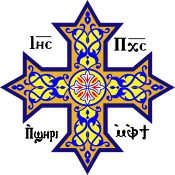Coptic nationalism
| Part of a series on the |
| Copts |
|---|
| Culture |
|
| Regions |
| Denominations |
|
|
Coptic nationalism refers to the nationalism of the
The Copts and Egyptian Muslims have many similarities in their identity, as they have lived amongst one another for centuries.[6] The relation between the Copts and Muslims was mostly relaxed before the 1960s, but afterwards the tensions between the respective groups grew. The violence against the Copts increased in the Nassar, Sadat and Mubarak eras. The Copts suffered in ethnic, political and material ways,[7][8][9] and realized they needed to strengthen their positions in these regards.[10] For example, many Copts sought refuge in the United States, which in turn weakened the position of the Copts who stayed in Egypt. These Copts today still face critics and violence against their churches and monasteries.[11]
Pharaonism
In the 1920s, when the Copts and Muslims worked together for the independence of Egypt, the questions of Egyptian identity rose to prominence. In the early twentieth century the political ideology of pharaonism was successful. The ideology known as the 'Pharaonist movement' or 'Pharaonism' looks to Egypt's pre-Islamic past and argued that Egypt was part of a larger Mediterranean civilization. In this way the Copts presented Egypt as more closely linked to Europe rather than to the Middle East.[12]
The Copts emphasize that they have lived in Egypt longer than the Muslims and are therefore an integral part of the history and the country. In that way it gives the Copts a claim to a deep heritage in Egyptian history and culture. With pharaonism the Copts claimed a deeply rooted national identity that transcends the religious opposition between Egypt's Muslim majority and Egypt's Christian minority.
Pharaonism was widely held by Coptic scholars in the early 20th century. The most famous writer in the pharaonism movement was Taha Hussein. But most scholars today see pharaonism as a late development shaped primarily by western Orientalism, and doubt its validity.[13] One of them is the Canadian archaeologist Michael Wood who argues that pharaonism glorifies a period no one can remember and that lacks visible signs for Egyptians because the common language, culture and alphabet of ancient Egypt does not exist anymore. Wood concludes that the 'Pharaonic past, used by the Egyptian nationalists, was simply the wrong past' to use for their nationalism.[14]
Coptic identity
During the
See also
References
- ^ Minahan 2002, p. 467 [dead link]
- ISBN 978-90-474-4436-7, retrieved 2023-05-17
- JSTOR 4153123.
- ^ "Egypt's Sisi meets world Evangelical churches delegation in Cairo". 19 Nov 2017.
- ISSN 0026-3206.
- ISBN 9789774165917, retrieved 2023-05-17
- JSTOR 4153123.
- ISBN 9780521603171, retrieved 2023-05-17
- S2CID 234613656.
- ISBN 9780521603171, retrieved 2023-05-17
- ^ Affairs, Berkley Center for Religion, Peace and World. "Minority (Trans)Nationalism between Egypt and the United States". berkleycenter.georgetown.edu. Retrieved 2023-05-17.
{{cite web}}: CS1 maint: multiple names: authors list (link) - ISBN 9789774165917, retrieved 2023-05-17
- .
- ISBN 9780520240698.
- ^ Refugees, United Nations High Commissioner for. "Refworld | World Directory of Minorities and Indigenous Peoples - Egypt : Copts of Egypt". Refworld. Retrieved 2023-05-16.
- ^ Refugees, United Nations High Commissioner for. "Refworld | World Directory of Minorities and Indigenous Peoples - Egypt : Copts of Egypt". Refworld. Retrieved 2023-05-16.
- ISSN 1871-2428.
- ^ Haeri, Niloofar. Sacred language, Ordinary People: Dilemmas of Culture and Politics in Egypt. New York: Palgrave Macmillan. 2003, pp. 47, 136.
- ^ Deighton, H. S. "The Arab Middle East and the Modern World", International Affairs, vol. xxii, no. 4 (October 1946), p. 519.
- ^ "COPTIC ASSEMBLY OF AMERICA - Reactions in the Egyptian Press to a Lecture Delivered by a Coptic Bishop in Hudson Institute". Archived from the original on 2016-03-04. Retrieved 2016-04-20.
- ISSN 1871-2428.
- ^ Deighton, H. S. "The Arab Middle East and the Modern World", International Affairs, vol. xxii, no. 4 (October 1946)
- S2CID 144166700.
- S2CID 144166700.
- S2CID 144166700.
- S2CID 144166700.
- S2CID 144166700.
- S2CID 144166700.
- ISSN 1871-2428.
Bibliography
- Shatzmiller, Maya (2005). Nationalism and Minority Identities in Islamic Societies. McGill-Queen's Press.
- Lin Noueihed, Alex Warren. The Battle for the Arab Spring: Revolution, Counter-Revolution and the Making of a New Era. Yale University Press, 2012.
- Jacques van der Vliet (2010). The Copts: ‘Modern Sons of the Pharaohs’?
- J.D. Pennington (1982). The Copts in Modern Egypt
- E.J. Chitham (1986). The Copts as a Minority group in The Coptic Community in Egypt
- Charles D. Smith (2005). The Egyptian Copts: Nationalism, Ethnicity, and Definition of Identity for a Religious Minority in Nationalism and Minority Identities in Islamic Societies. McGill-Queens's Press.
- F.F. Andrawes & A. Orr-Andrawes (2019). ‘Two communities, one nation’ Coptic Christians and Muslims in Egypt’. American University in Cairo Press.

